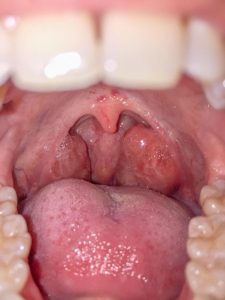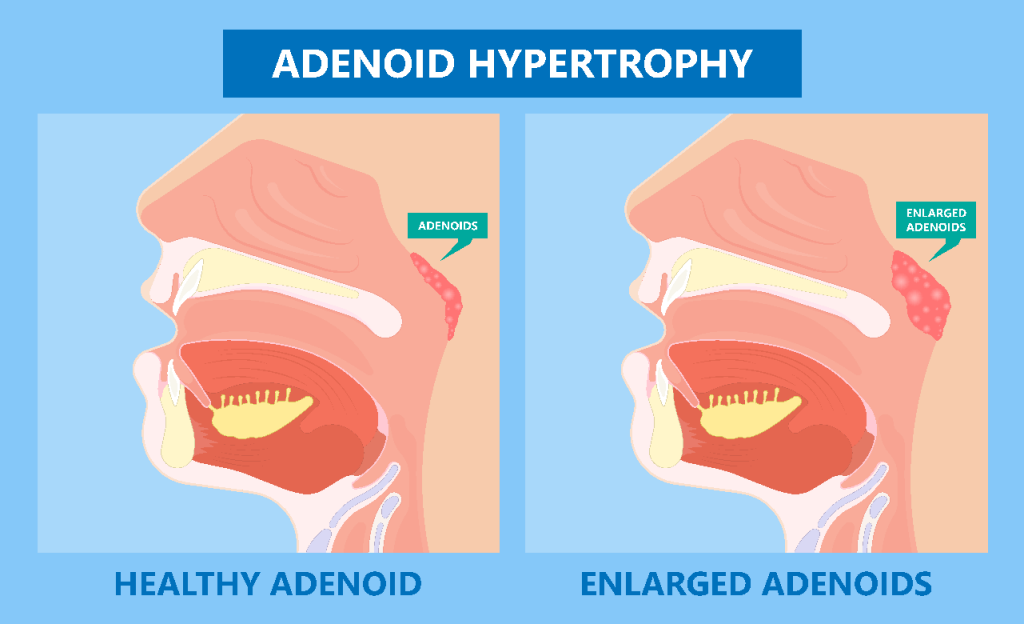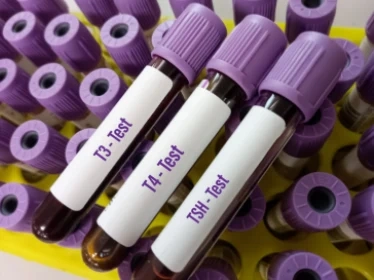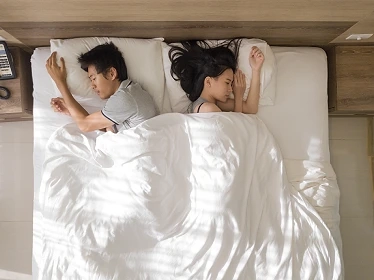TONSILS AND ADENOIDS
WHAT ARE TONSILS AND ADENOIDS?
Tonsils and adenoids are part of a “ring” of glandular / lymphoid (white blood cell) tissue encircling the back of the throat.
Tonsils are visible at the back of the mouth, one on each side. The adenoid is found high in the throat, right behind the nose and needs special instruments or an X-ray in order to view it. Knowing the tonsils and adenoids location helps in understanding the symptoms and problems related to these tissues.

Figure 1. Photograph showing fleshy enlarged right and left tonsils at the back of the throat with appearance similar to meatballs.

Figure 2. Diagram highlighting the position of the adenoids at the back of the nose.
WHAT IS THE FUNCTION OF THE TONSILS AND ADENOIDS?
The tonsils and adenoids function as part of the immune system, acting as “policemen” and help defend the body against bacteria and viruses which enter through the nose and the mouth. This function is vital in infants and children up to the age of 3 years old. Thereafter the body’s lymph node groups and liver develop to take over this function.
Studies have shown that children who have had their tonsils or/and adenoids taken out, suffer no loss in their immunity to various diseases.
COMMON PROBLEMS WHICH REQUIRE REMOVAL OF TONSILS/ ADENOIDS
- Recurrent tonsillitis
Presents as frequent sore throat and high fever - Snoring/ obstructive sleep apnea
Enlarged tonsils and adenoids can cause severe obstruction to breathing especially when the child is asleep. The child may snore in his sleep or exhibit episodes whereby he appears to stop breathing altogether. He may also have gasping episodes resulting in frequent awakening at night. If untreated this may impact a child’s daytime behavior (mood and focus) and in the long run, may impact his jaw development, and lead to lung and heart complications. - Chronic Otitis Media with Effusion
Persistent fluid collection in the middle ear causing hearing loss and poor speech. - Peritonsillar Abscess
This is a medical emergency whereby pus collects around an infected tonsil. The child has great difficulty swallowing and breathing with a high fever. He may be extremely ill and dehydrated and may require intensive care. - Tumours
This rarely occurs in children but enlarged tonsils with an unusual appearance warrants removal for further diagnosis.
WHY REMOVE TONSILS AND ADENOIDS?
Children with persistent or severe symptoms may be diagnosed with chronic disease of tonsils and adenoids. In such cases, surgical intervention is recommended to improve breathing, sleep and overall health. Understanding why removing tonsils and adenoids can help parents make informed decisions about their child’s treatment.
IS TONSILS AND ADENOIDS A MAJOR SURGERY?
The surgery for removal of tonsils / adenoids is quite common. It is done under general anesthesia and requires one night admission to the hospital. The surgery is done entirely through the child’s mouth with specialised equipment and there will be no wounds on your child’s face. He will not be aware of the procedure throughout the entire process.
He will be required to fast overnight (no food and drinks after 12 midnight before the operation day).
For a younger child, a shorter period of fasting might be advised depending on the anesthetist’s assessment.
While the surgery is common, any medical procedure carries risks and should be carefully evaluated.
BEFORE SURGERY
If your child has a cough or fever before the surgery, please kindly inform our clinic team for rescheduling. The surgery will be postponed if the child is found to be unfit for surgery (active upper respiratory tract infection).
If the child has any family history of bleeding disorder or any previous problems with anesthesia, please kindly inform the doctor.
SOON AFTER THE SURGERY
The child might feel sleepy after the surgery (side effects of anesthesia). This does wear off after a few hours. After which, he will be allowed to drink water and have some ice cream to soothe his throat. Knowing the types of food to eat after tonsils and adenoids can aid in recovery.
Local anesthesia and other pain medications will be administered intra-operation and after, to best manage a child’s pain. Most children will be able to speak, eat and breathe normally a few hours after surgery. They will feel a mild sore throat for about 5-7 days.
The child may have mild blood-stained nasal discharge/ sputum/ saliva for the first 48 hours after surgery. Should he throw up large amounts of blood, he needs to be brought to the emergency room immediately. Please contact your surgeon/ clinic urgently should this arise.
CARE AFTER THE SURGERY
The child will have sore throat and dryness of the mouth but this improves after 3 days. Eating and drinking should be resumed and encouraged as this will prevent debris from accumulating and aid in recovery from surgery.
The pain medications should be taken to relieve throat discomfort. The entire course of the antibiotics must be completed.
The tonsillar bed at the back of the mouth will have a white coating in the recovery period. This is normal.
THINGS TO AVOID AFTER SURGERY
- Acidic / citrus fruit juices such as orange juice, lime juice to prevent irritation of the throat
- Frequent coughing or clearing of the throat as this may induce bleeding from the wound
- Physical exercise for one month
- Overcrowded places and smokers as this may cause the child to catch a viral infection with resultant wound bleeding
- Contact with people suffering from cough, colds and other infections
AFTER DISCHARGE
Take a soft diet for one week to help in wound healing.
Oral hygiene should resume as normal.
The child can revert to a normal diet after the first week. During the first week, the child stays at home and may return to school one week after the operation.
Encourage the child to consume plain water frequently to keep the throat moist and clean for the first week.
Children above 12 years old are encouraged to gargle their mouths after each meal.
PLEASE KINDLY CONSULT A DOCTOR IF YOUR CHILD HAS THE FOLLOWING SYMPTOMS
- Fever more than 38 degrees
- Large amount of bleeding from the throat such as excessive swallowing or vomitus with fresh blood
- Severe pain of the throat or ear which is not relieved by pain medications
- Any prolonged or abnormal symptoms which may cause concern for example severe neck pain (known to occur exceedingly rarely)
If the above symptoms persist, please kindly contact your surgeon and proceed to the emergency room of your hospital immediately.
REVIEW APPOINTMENT
Your child will be reviewed two weeks from the date of discharge. Any histology report will be updated to you at this review. Your doctor will also check on the condition of the tonsillar wound. Please kindly keep your scheduled appointment.





